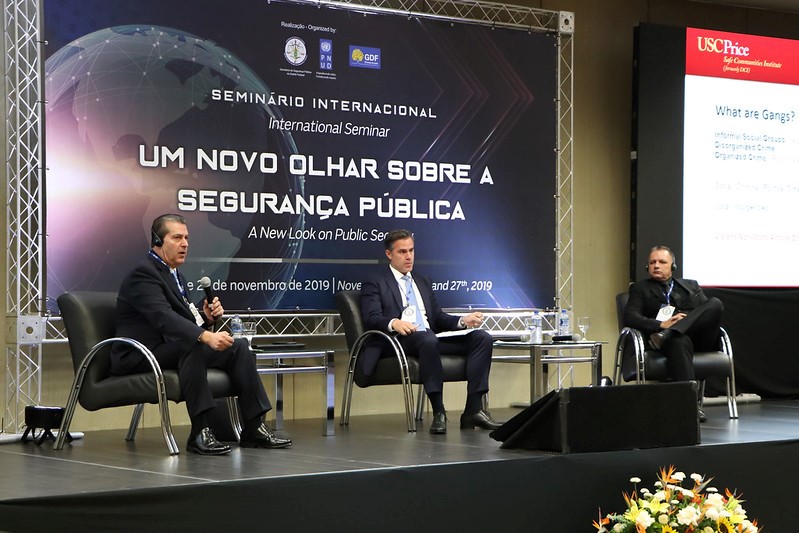SCI instructor Dr. John P. Sullivan participated in an international seminar on the future of public safety in Brasilia. The three-day seminar, Um Novo Olhar sobre a Segurança Pública – “A New Look in Public Safety,” was sponsored by the Secretaria de Estado de Segurança Pública do Distrito Federal (Public Safety Secretary of the Federal District) in Brasilia, Brazil in November 2019.
Dr. Sullivan presented “Transnational Crime and the State: Criminal Insurgencies, Crime Wars, Gangs, Mafias, and Cartels” during the panel on penitentiary systems. The panel was moderated by Under Secretary Alfredo Carrijo, Public Security Secretariat, Brasilia, and in addition to Dr. Sullivan, it included Secretary Luis Mauro Albuquerque Araújo, Penitenciária do Ceará.
Secretary Araújo briefed on the situation at prisons in Ceará state in northeastern Brazil where gang warfare in the prisons has spread to the streets. Following their presentations, Sullivan and Araújo participated in a moderated discussion examining the nature of gang violence and transnational organized crime, the nexus between prison gangs and urban insecurity, and the need for multilateral cooperation and intelligence sharing to combat transnational gangs and criminal cartels.
Dr. Sullivan’s article, “The Challenges of Territorial Gangs: Civil Strife, Criminal Insurgencies and Crime Wars,” was published in the Revista Do Ministério Público Militar, Edição n. 31, a journal published by Brazil’s military public prosecutor ministry that addresses military and criminal justice issues from a legal perspective.
Following the panel discussion, Dr. Sullivan met with the Hon. Jaime de Cassio Miranda, Procurador-Geral de Justiça Militar (Attorney General for Military Justice) to discuss his research on third generation gangs (3Gen), territorial gangs and criminal insurgency.
Dr. Sullivan, a retired lieutenant with the Los Angeles Sheriff’s Department, lectures on gangs and criminal cartels in the Public Safety Leadership Program (PSLP) and Executive Leadership Program. His research on emerging transnational criminal threats highlights the importance of integrated and collaborative community safety initiatives that emphasize transparent research and evidence-based, problem solving and transparent law enforcement and public safety engagement with the communities they serve to mutually address crime and insecurity.




 SCI Spotlight -
SCI Spotlight -